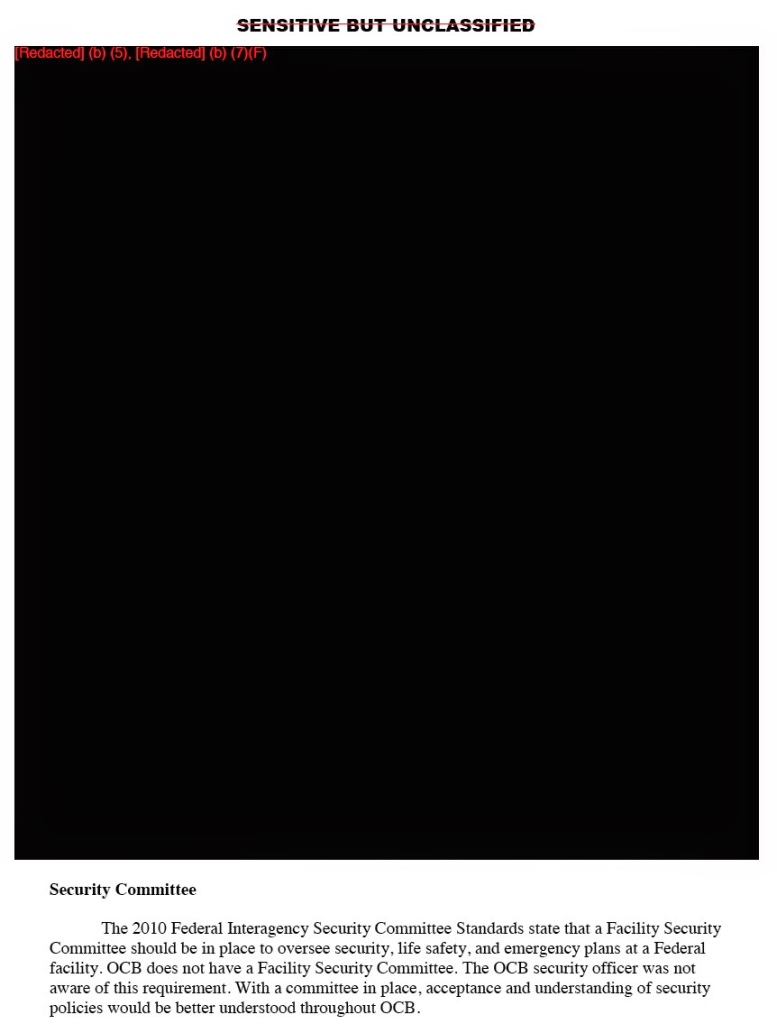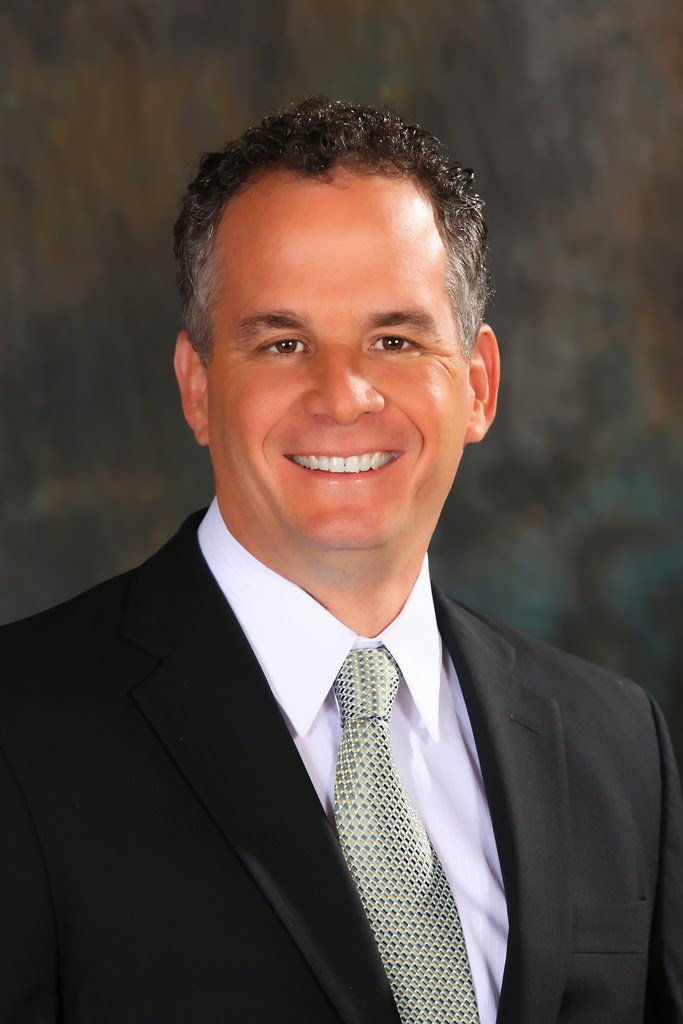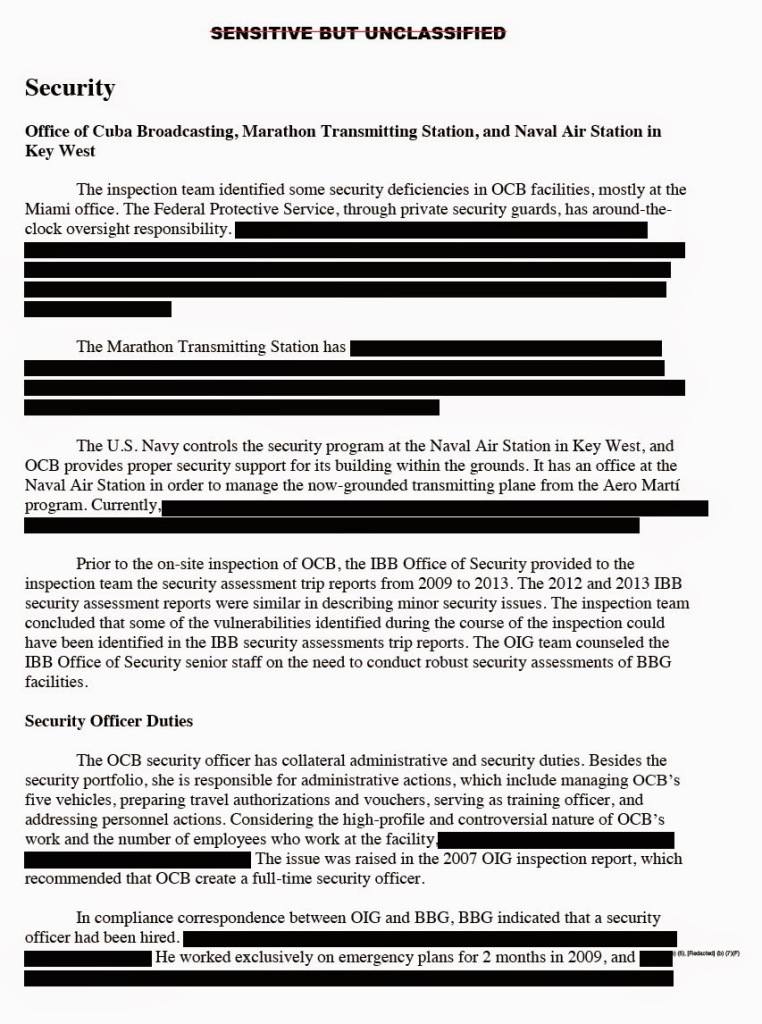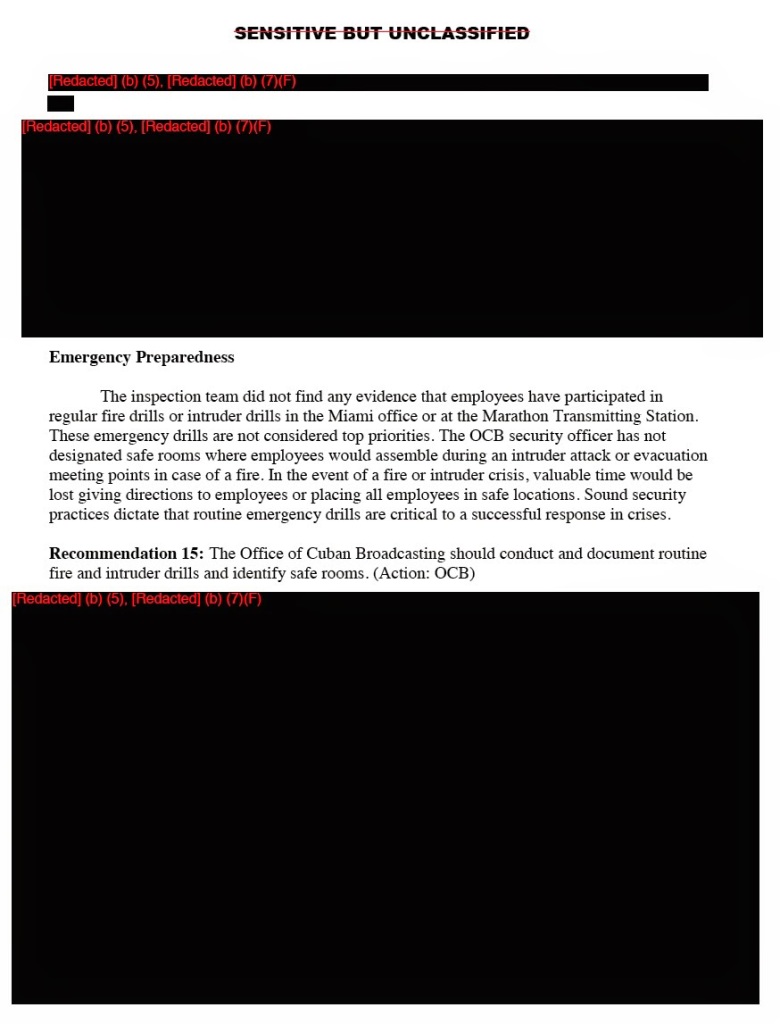
Inspectors rip Office of Cuba Broadcasting
Inspectors visiting the Office of Cuba Broadcasting found low morale, a lack of transparency in decision making, administrative weaknesses, security lapses and one instance of property theft.
An Inspector General’s report casts a negative light on the agency’s leaders, including Director Carlos A. Garcia-Perez, who took charge four years ago this month.
The 34-page report also provides interesting details about the agency’s efforts in Cuba. It says the OCB has “engaged in an aggressive campaign to distribute weekly its television programming content via broadcast, Internet, and even hand-to-hand, via digital video disks (DVD) and flash drives.”
The report, dated July 2014 and marked “sensitive but unclassified,” says OCB:
- Delivers to Cuba every week 1,000 DVDs containing TV Martí programming.
- Distributes paper flash drives equipped with a tiny electronic interface that allows the sharing of data.
- Sends a biweekly newsletter called El Pitirre to more than 75,000 email addresses in Cuba.
- Operates Piramideo, an SMS-based social network that operates outside Cuban government control.
Pages dealing with the security problems are heavily redacted.

- The Office of Cuba Broadcasting has focused its programming on subjects, such as news, sports, and entertainment that are generally censored by the Cuban Government. Besides radio (shortwave and mediumwave) and television platforms, the entity has made its digital platforms more robust, going beyond the news Web site by making available and distributing its programming in Cuba through innovative programs.
- The Office of Cuba Broadcasting is implementing successfully the Broadcasting Board of Governors’ 5-year strategic plan for 2012 through 2016, Impact through Innovation and Integration, and its own programming goals.
- Employee morale is a concern. Office of Cuba Broadcasting staff expressed that the current management does not communicate effectively and the decision-making processes lack transparency. Many employees expressed fear of reprisal by management if they raise concerns.
- Several administrative functions require greater oversight from administrative staff in the Office of Cuba Broadcasting and the International Broadcasting Bureau support offices, including the Office of Contracts, the Office of the Chief Financial Officer, and the Office of Property Management.
- The Office of Cuba Broadcasting has several administrative weaknesses in the areas of contracting, human resources, financial reviews of unliquidated obligations, property management, and travel.
- Two contracting issues require closer oversight: contract administration procedures and contracting officer’s representative designation.
- The security program requires attention, especially in the area of emergency preparedness and physical security at the Miami office.
The 1983 Radio Broadcasting to Cuba Act requires Radio Martí to follow Voice of America (VOA) journalistic standards and guidelines for presenting a variety of news and information in an accurate and objective manner. The first transmission to Cuba began in 1984. OCB has the following legislated mission:
- Support the right of the people of Cuba to seek, receive, and impart information and ideas through any media, regardless of borders;
- Be effective in furthering open communication of information and ideas through use of Radio Martí and Television Martí programming to Cuba;
- Serve as a consistently reliable and authoritative source of accurate, objective, and comprehensive news; and
- Provide news, commentary, and other information about events in Cuba and elsewhere to promote the cause of freedom in Cuba.
 The mission of the Martís under the current leadership is to open up the Internet in Cuba; engage and empower Cubans with relevant information and news, as well as tools to circumvent censorship; bring an open social network to Cuba; and allow Cubans to connect, converse, and spread the word, free from government control.
The mission of the Martís under the current leadership is to open up the Internet in Cuba; engage and empower Cubans with relevant information and news, as well as tools to circumvent censorship; bring an open social network to Cuba; and allow Cubans to connect, converse, and spread the word, free from government control.
Radio Martí broadcasts on mediumwave and shortwave. It also broadcasts via satellite and via purchased air time on a South Florida private television station. Both of these broadcasts can be seen in Cuba. At the time of the inspection, OCB was testing placement of its programming on an FM station from Key West.
Cuba is one of the most politically and geographically isolated societies in the world. It is not possible for BBG to conduct nationally representative audience surveys in Cuba because of the highly restrictive political and media environment, though BBG is able to conduct some focus groups with recent immigrants from the island. Given these circumstances, OCB measures performance on the basis of daily interaction with the audience and a host of impact criteria, including jamming and government responses to news coverage.
The director started in November 2010. He has refocused the needs and interests of the Cuban people with a vision of moving forward and not looking backward by putting more emphasis on the digital platform.
In 2011, he oversaw the complete overhaul of the station’s programming and the relaunch of www.martinoticias.com. Officials from BBG and the Department of State (Department) have a favorable view of the director for transforming OCB into a multimedia news hub.
 Many OCB employees had concerns about the director’s management structure. Although the director holds frequent town hall meetings to communicate with staff, the employees view these meetings as “one-way communication,” and they feel that frank exchanges or questions are not allowed. The director maintains that he encourages questions at these meetings and has an open door policy, but many of the employees said the director does not communicate how their concerns are being addressed. Others feel that that they are not consulted as part of the decision-making process. The inspection team counseled the director on this and other managerial issues and suggested remedial actions.
Many OCB employees had concerns about the director’s management structure. Although the director holds frequent town hall meetings to communicate with staff, the employees view these meetings as “one-way communication,” and they feel that frank exchanges or questions are not allowed. The director maintains that he encourages questions at these meetings and has an open door policy, but many of the employees said the director does not communicate how their concerns are being addressed. Others feel that that they are not consulted as part of the decision-making process. The inspection team counseled the director on this and other managerial issues and suggested remedial actions.In responding to the OIG personal questionnaires and in interviews, many of the OCB employees rated their morale as low. Some of the reasons cited for low morale included the lack of transparency in decision-making, the inability to offer suggestions, and the lack of effective communication. Others were concerned about raising any issues to the inspection team because
of fear of retaliation by management. OCB management was surprised by the inspection’s assessment on morale because in the 2013 Office of Personnel Management’s Federal Employee Viewpoint Survey, OCB employees gave high scores in categories of work experience, leadership, and supervisors. The inspection concluded that employee morale is a concern and senior management needs to take additional steps to allow employees to offer suggestions and communicate with them effectively without fear of reprisal or intimidation. It is important for OCB management to make employees part of the decision-making process. The inspection team also determined that the 2013 Office of Personnel Management’s Federal Employee Viewpoint Survey did not ask questions about morale, but rather asked participants to rate their satisfaction in general categories like work experience, leadership, and supervisors. The inspection team suggested that OCB management form an employee working group to generate solutions for management on addressing employees concerns. Low morale was an issue addressed in the 2007 OIG inspection report on OCB and the 2009 GAO report on OCB broadcasting operations.
OCB radio and television programs seek to represent the best of U.S. media, providing a contrast to Cuban state media. It increasingly tailors its products, realizing that consumption of Martí media is against the law in Cuba. Recent Radio Martí programs added to the schedule include a morning news magazine designed for “in and out” listening, lighter programming at midday to reach casual listeners for shorter or longer periods, and coverage of Major League Baseball and other sports unavailable to Cuban audiences. Television programs have paid more attention to graphics and presentation style to provide a greater contrast with Cuban state media, which still uses outdated technology. TV Martí products include nightly uncensored newscasts, weekly specials that frequently highlight voices banned on the island, and a weekly program of films produced in Cuba.
According to OCB, between early 2011 and spring 2012, the number of daily visitors to www.martinoticias.com increased. In FY 2013, Web traffic averaged between 180,000 and 200,000 visitors per month. Beyond these multimedia efforts, OCB has also engaged in an aggressive campaign to distribute weekly its television programming content via broadcast, Internet, and even hand-to-hand, via digital video disks (DVD) and flash drives. One of the most successful new strategies is short message service (SMS) text messaging and emails. Cuban citizens are able to contact the Martí newsroom directly to report news in the making and abuses perpetrated by the Cuban Government or to provide valuable feedback.
The inspection team reviewed documentation of OCB innovative programs in the digital platform. To distribute Martí programming, OCB is delivering to Cuba 1,000 DVDs weekly. It is estimated that each DVD will be viewed in 50 households. Using the latest, cutting-edge technology, OCB is distributing flash drives made of paper, with a small electronic interface. This flash drive can share electronic data and digitally connect with other devices. Taking advantage of the increasing use of mobile telephones on the island, OCB launched Piramideo, which is an SMS-based social network that makes it easier for people inside Cuba to share information and connect with one another; this tool operates outside Cuban Government control. OCB also launched El Pitirre, a biweekly newsletter that is sent to more than 75,000 email addresses in Cuba.
OCB began using Aero Martí, a leased aircraft-based television broadcast system targeting Cuba for transmission of TV Martí programming in October 2006. Over the years, the Cuban Government has jammed Aero Martí’s signal. The cost of this program from FYs 2006–2013 was $35,677,660. During the inspection, Aero Martí was currently inactive, with storage temporarily funded at $79,524 per year. Because of sequestration cuts, no funding was appropriated for fuel expenses. OCB views the aircraft as a “special tactics” tool, suited for broadcasting, should the Cuban Government stop jamming its signal. BBG has unsuccessfully proposed ending the use of Aero Martí in its FYs 2013 and 2014 Congressional Budget Requests, stating that Aero Martí should be eliminated because of decreases in its cost-effectiveness and increased fuel-related costs. In 2013, the Aero Martí program was halted as a result of sequestration. With the approval by Congress of BBG’s FY 2014 budget, the program officially ended in April 2014.
Many of the tactical steps outlined in BBG’s 5-year strategic plan are also activities that OCB is very much engaged in, including #3: Seize Targeted Growth Opportunities, which OCB does by engaging with younger audiences through all digital initiatives; #4: Prioritize Support for Democracy and Countering Pockets of Extremism, which OCB supports by interviewing leaders of the dissident movement in Cuba, such as Yoani Sánchez, Berta Soler, Antonio Rodiles, Eliecer Avila, Guillermo Fariñas and others; #5: Rationalize Program Delivery; #6: Combat Internet Censorship and Jamming; #7: Elevate and Expand Social Media Innovation; #8: Employ Leading-Edge Communication Techniques and Technologies; and #11: Spur Development through Targeted Media Initiatives and Training. OCB addresses all of these through the new emphasis on digital and social media and Internet anticensorship activities.
The OCB FY 2014 funding is estimated at $23.8 million, as published in the BBG FY 2014 Congressional Budget Request. As of December 2013, OCB had 111 full-time direct-hire employees, supplemented by 83 purchase order vendors and stringers.
The inspection team reviewed the FY 2013 travel authorization and vouchers for the top five travelers at OCB. The review revealed that that two of the five travelers did not have a U.S. Government travel card. One of these travelers was the OCB director, who took 20 trips during FY 2013. When the inspection team brought up the travel card issue to the OCB director, he agreed to apply for a U.S. Government travel card.
The inspection team identified several management control weaknesses in administrative operations, including lack of financial management review for unliquidated obligations, anomalies in the travel of the acting general manager, and lack of contracting oversight and property management procedures.
As of September 3, 2013, prior to the on-site inspection, OCB had approximately $2.2 million in unliquidated obligations for FY 2013. The BBG Office of Chief Financial Officer generates a monthly status of unliquidated obligations report.11 These reports are sent to BBG offices, including OCB, for review. OCB asserts that it reviews monthly unliquidated obligations reports received from the Office of Chief Financial Officer and deobligates items that are determined to be no longer valid. However, given the large amount of unliquidated obligations in FY 2013, it leads the inspection team to determine that OCB has not been periodically reviewing obligations and certifying whether they are still valid or whether funds or available balances can be deobligated.
The acting general manager has a unique travel arrangement. On June 19, 2013, about 2 months after the temporary detail started, OCB, the IBB Office of Performance Review, and the Office of the Chief Financial Officer entered into an informal travel arrangement that describes the travel support for the OCB acting general manager. On the basis of the needs of OCB and the Office of Performance Review, the acting general manager, who is an employee with the IBB Office of Performance Review based in Washington, DC, is on extended detail and TDYs between Washington, DC, (permanent duty station) and Miami (TDY location). Directors of both OCB and the Office of Performance Review have agreed to let the employee commute as needed between his permanent duty station, TDY location, and his home in Los Angeles (his second residence). The extended TDY began in early April, with no foreseeable end date.
OCB has items, such as portable video cameras, that are routinely removed for usage without any hand receipts or property passes, as required by BAM 12-107.4, Hand Receipts, and BAM 12-108, Removal of Property Non-Expendable Property. In June 2013, an OCB video camera and related equipment valued at $25,154 were stolen from an OCB vehicle. The inspection team found no evidence that a hand receipt was assigned to an employee or employees. Currently, the property control officer does not follow a process to comply with BAM 12-112, Reporting Lost, Stolen, Damaged, or Destroyed Property. This lack of accountability and documented process in place may result in loss or theft of high-value items.
Director
Carlos A. Garcia-Perez
General Manager (Acting)
John Lippman
Director for Administration
Irvin Rubenstein
Staff Director
Emilio Vasquez



